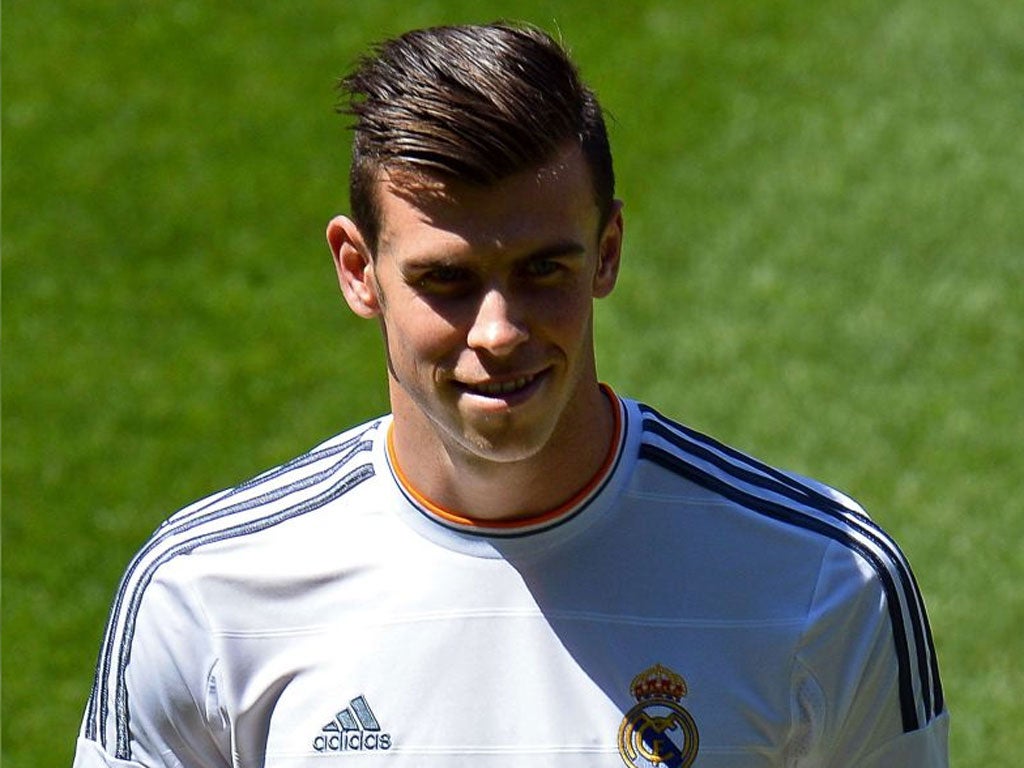The Last Word: Gareth Bale deserves going rate for his job – that’s entertainment
Part of Britain’s tendency to sneer at footballers is born of snobbery

Your support helps us to tell the story
From reproductive rights to climate change to Big Tech, The Independent is on the ground when the story is developing. Whether it's investigating the financials of Elon Musk's pro-Trump PAC or producing our latest documentary, 'The A Word', which shines a light on the American women fighting for reproductive rights, we know how important it is to parse out the facts from the messaging.
At such a critical moment in US history, we need reporters on the ground. Your donation allows us to keep sending journalists to speak to both sides of the story.
The Independent is trusted by Americans across the entire political spectrum. And unlike many other quality news outlets, we choose not to lock Americans out of our reporting and analysis with paywalls. We believe quality journalism should be available to everyone, paid for by those who can afford it.
Your support makes all the difference.Gareth Bale is underpaid. I know, I should be tarred and feathered for saying such a thing when the 24-year-old Welshman will earn nearly £15m a year before tax in Spain, where more than half those his age cannot even get a minimum wage job.
Matt Le Tissier, the former England and Southampton striker, described Bale’s salary from Real Madrid – distilled to £300,000 a week under the arcane gauge that persists in football – as “obscene”.
Le Tissier is, of course, right. It is an indecent amount of money. But so is the $58m (£37.2m) earned last year by Justin Bieber, the 19-year-old Canadian pop star who, when he’s not selling millions of records, is prone to slouching around shirtless and swearing at photographers.
And so too the $75m paid to Robert Downey Jnr, who according to Forbes was Hollywood’s highest-paid actor in the 12 months to June. Like Bale, Downey is a player in a global entertainment industry.
The 48-year-old star of The Avengers, the third-highest grossing film of all time, can command such astronomical fees because Marvel Studios (Disney) believe him to be integral to the success of their comic book franchise on the big screen. Iron Man 3 alone made $1.14bn at the box office.
Real Madrid, the world’s richest club, turns over roughly half that each year but, with expansion plans set to increase capacity at the Bernabeu to 93,000, it is a figure not beyond reach.
Real’s president, Florentino Perez, believes Bale can be just as pivotal to the commercial fortunes of one half of Spain’s great football duopoly so he has broken his own transfer record to buy him from Tottenham for nearly £86m.
The economics of top football clubs and Hollywood studios are not so different. Both invest huge sums in rare talent, a tiny proportion of whom ever yield a return; both charge for content; both sell merchandise on the back of the brightest stars they create.
They are high-risk, high-reward enterprises whose imminent demise is regularly predicted on the basis of financial unsustainability, yet consumer demand continues to keep them in clover
Sure, cinema tickets are much cheaper but it is not a like-for-like comparison. Millions of people can watch a film simultaneously in cinemas around the world. Stadium capacities are limited. Can you imagine how much Disney would charge for Iron Man Live?
Let’s look at the market realities. Is £15m a year for the “best” (that is a debate to fill another page) player in the world really excessive in an industry worth billions?
The top 20 clubs generated revenues in 2011-12 of more than €4.8bn (£4bn), according to Deloitte’s Money League, but that doesn’t capture the true size of the global football business.
Forget the £86m transfer fee because that is an accounting mechanism: Real Madrid instantly recouped half of it with the sale of Mesut Ozil to Arsenal. We are talking about what top footballers get paid to do a job that only the gifted few can do.
They’re a bargain compared to their peers in music and film. David Beckham and Lionel Messi aside, no footballer can match the top 10 highest earners in Hollywood.
Bale’s salary would buy you Will Smith who would happily admit to an off year. After Earth, which cost Sony Pictures $135m to produce, was one of the biggest flops of the summer.
Maybe we think our film stars are overpaid too. But I don’t hear people saying Smith, Downey or Bieber earn too much.
Part of Britain’s tendency to sneer at footballers is born of a tutting snobbery – “How much to kick a ball? And they can’t even speak properly.” We don’t hold film or pop stars up to the same exacting moral standards. In fact, the more badly behaved, the better – it shows a depth of character.
Yet, I’d far rather my sons idolised Bale, a clean-living young dad, than Downey, who served time on drugs charges and spent a decade in and out of rehab.
We need to stop comparing footballers to ordinary workers. A good start would be to ditch the weekly wages concept whose false sense of relativity provokes instant resentment.
Why are we so outraged that top footballers are millionaires? So are many top doctors, bankers, lawyers, retailers, technologists and engineers. But people don’t pay to watch them at work. So long as we do, we must accept it comes at a market price.
Join our commenting forum
Join thought-provoking conversations, follow other Independent readers and see their replies
Comments